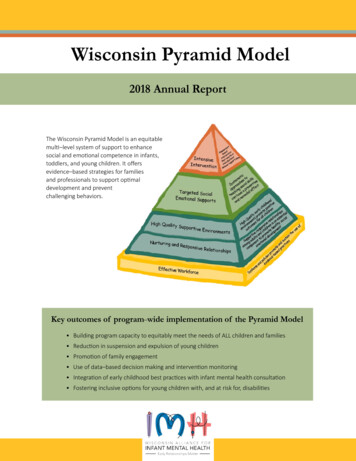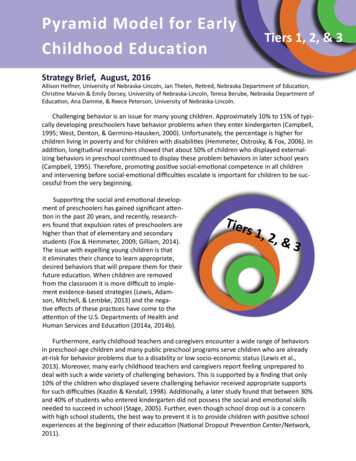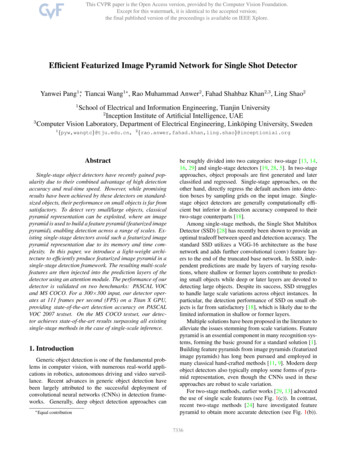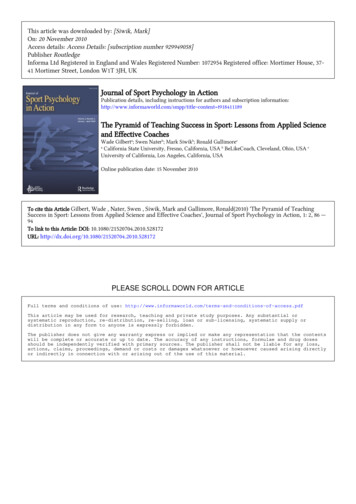
Transcription
Wisconsin Pyramid Model2018 Annual ReportThe Wisconsin Pyramid Model is an equitablemulti–level system of support to enhancesocial and emotional competence in infants,toddlers, and young children. It offersevidence–based strategies for familiesand professionals to support optimaldevelopment and preventchallenging behaviors.Key outcomes of program–wide implementation of the Pyramid Model Building program capacity to equitably meet the needs of ALL children and families Reduction in suspension and expulsion of young children Promotion of family engagement Use of data–based decision making and intervention monitoring Integration of early childhood best practices with infant mental health consultation Fostering inclusive options for young children with, and at risk for, disabilitiesWisconsin Alliance for Infant Mental Health1
What is the Pyramid Model?Relationship is a key change agent in early childhood. Pyramid Model Training focuses on practices that address relationships, environments, intentional teaching andindividualized interventions. Program–wide implementation of the Pyramid Model is arelationship based professional development framework that is child and family centered. Program–wide implementation intentionally addresses competency, leadership,and organization.Racial disparities in discipline are reduced in early care and education programswhen culturally responsive practices, naturally embedded in the Wisconsin PyramidModel, are intentionally emphasized during training, coaching, and implementation.The Pyramid Model is a national innovation for an equitable multi-leveled system of support to enhance social andemotional competence in infants, toddlers and young children. Program–wide implementation of the Pyramid Model is often called Early Childhood Positive Behavioral Interventions and Supports (PBIS).The Pyramid Model is NOT a curriculum package, but a collection of programs and evidence–based classroom practices—selected by experts in Early Childhood research—to support optimal development and prevent challengingbehaviors.Program wide implementation of the Pyramid Model emphasizes the use of evidence–based practices with fidelity.Levels of Pyramid Model ImplementationProgram–wideImplementationTraining with TechnicalConsultationParticipating in PyramidModel content trainingThe goal of trainingis dissemination ofinformation andincreased awarenessof Pyramid ModelPractices.2Pyramid Model trainingwith Community ofPracticeThe goal of theCommunity of Practiceis reflection on use ofclassroom/programpractices.The technical assistancecadre is versed inpractices aimed atproviding support forimplementation of keyPyramid Model practice,often at the universallevel. The goal ofconsultation is programimprovement.Program–wideimplantation sites assessand build programclimate, infrastructureand procedures thatpromote and supportteachers to use evidence–based practices. Theyanalyze program,classroom, and childlevel data to selectivelyplan next steps. Thegoal of program–wideimplementation is thesuccess of children andfamilies.2018 Pyramid Model Annual Report
The Pyramid Model Works for WisconsinBecause of Intentional and Prioritized EffortWisconsin has been building and enhancing the stateinfrastructure since awarded a competitive technicalassistance grant from The Center for the Social and Emotional Foundations for Early Learning (CSEFEL) in 2009.Since that time, a cross sector and representative StateLeadership Team has been meeting at least quarterly toguide efforts to build infrastructure for implementationof the evidence–based practices promoted by the Pyramid Model in Wisconsin.This team utilizes data from the State Early Childhood Benchmarks of Quality to guide implementation.The resulting Statewide plan is primarily enacted by twoState leads—a Statewide Coordinator and a StatewideTraining & Coaching Coordinator.Since 2009, Wisconsin’s Pyramid Model StatewideCoordinators have led project groups to: Adapt national Pyramid Model training contentto create comprehensive training packages representing Wisconsin’s cross sector early childhoodsupport, to include examples from Wisconsin’s program–wide implementing sites, and to align withother important Wisconsin efforts (e.g., WI ModelEarly Learning Standards, Infant Mental Health Competencies);Ensure Registry recognition for Pyramid Modeltraining participation;Embed Pyramid Model content into the WI Technical College Early Care and Education degree pathway;Develop a mentoring model to ensure that newPyramid Model trainers are recruited to fill needsand are supported to deliver the content as designed;Provide support for regional Pyramid Modelcommunities of practice to ensure statewide crosssector access to training content despite fragmented funding sources;Maintain emphasis on promoting Pyramid Modelparent content by developing mentoring modelsthat support implementation of the Parents Interacting with Infants (PIWI) and Positive Solutionscontent;Create a readiness process that guides selectionof programs to participate in Wisconsin’s four-dayImplementation Academy;Create a data system that allows programs to moncontinued on page 4Wisconsin Pyramid Model Training Strands“Throughout this training I have felt relieved to know that other teachersare having the same good or bad experiences I have had. I think I amnaturally very Pyramid Model minded, but love that I can now have theseguidelines and research to back myself up.” Pyramid Model Training ParticipantWisconsin Alliance for Infant Mental Health3
continued from page 3itor their implementation progress while providing theState Leadership Team with data to continue to improvetraining and technical assistance content; Work with authors of the Teaching Pyramid Observation Tool (TPOT) to build capacity for WI-based TPOTtrainers who ensure internal coaches are able to usethe TPOT reliably for coaching Convene an external coaches community of practice Serve in an advisory capacity for intentional connections to: Wisconsin’s YoungStar Quality Rating ImprovementSystem School wide Mental Health Framework Infant and Early Childhood Mental Health Consultation Wisconsin Home Visiting training and technicalassistance Wisconsin Positive Behavioral Interventions andSupports (PBIS) Wisconsin’s PreK to Adult Social and EmotionalLearning Competencies.Wisconsin Pyramid Modelby the Numbers Over 11,030 individuals trained in Pyramid Modelcontent since 2010 Over 469 Pyramid Model content trainings since2010 120 Pyramid Model trainers of classroom practices,many ready to serve as program–wide coaches 13 cohorts of sites launched through 13 PyramidModel Implementation Academies 36 programs teaming to implement Pyramid Modelprogram–wide, with 108 program–wide implementing sites (individual locations) in these programs 305 Pyramid Model classroom/internal coaches 10 Pyramid Model program–wide external coaches 16 members serve on the Pyramid Model state leadership team4External Coaching:A Key to FidelityThe External Coach’s core roles andresponsibilities include: Work with a program’s leadership team to supportimplementation of Pyramid Model practices withfidelity, utilizing implementation science. Support the capacity of the internal coach topromote use of the evidence–based practicespromoted by the Pyramid Model. Attend Pyramid Model Implementation Academyand help program team to complete Benchmarksof Quality. Assist the program’s leadership team in collecting,analyzing and reporting data to monitor program,teacher and child outcomes resulting from implementation. Support the program’s leadership team in identifying implementation priorities based on Benchmark of Quality data and team implementationcontent. Assist the administrator in sharing informationwith staff, families and board regarding implementation. Communicate with state coordinators; networkand collaborate with other external coaches andRegional Communities of Practice; and participatein Pyramid Model state workgroups as outlined bythe Pyramid Model State Action Plan. Serve as an ambassador of the Pyramid Modelinitiative within other state initiatives. Utilize Pyramid Model resources and provide information to support team discussion and decisionsusing materials from the Resource Sharing websiteand team binder. Understand and apply the components of effectivemeeting facilitation. If necessary, assist programs in ensuring that allstaff have been trained in Pyramid Model content.2018 Pyramid Model Annual Report
Data Shows the Pyramid Model Works in WisconsinIn 2016, the WI Department of Public Instruction fundedan evaluation of Wisconsin’s Pyramid Model initiative.The results indicated that children in Pyramid Model4K classrooms in sample communities in Wisconsin hadbetter social and emotional skills and less problematicbehavior than children in non-Pyramid Model classroomsin the same community. Most significantly, children inPyramid Model classrooms with the most concerningchallenging behavior in the Fall had scores indicatingtypical development in the Spring.Internal coaches used the Teaching Pyramid Observation Tool—a scientifically validated coaching/assessment tool. The tool supports coaches in providing teachers with highly individualized feedback and guidance toimplement the evidence–based practices prioritized bythe teacher. On-site coaching supports Pyramid Modelclassroom teachers to not only use significantly moreevidence–based practices than their “trained only”counterparts, but to use those practices consistentlyand intentionally throughout the year.This increased use of intentional instructional practice and support creates an equitable context for successin Pyramid Model classrooms and yields the result ofclosing gaps for children identified as having the greatestneed (1.84 SD above the mean in the Fall) by teachingthem skills correlated with positive adult outcomes.Wisconsin Alliance for Infant Mental HealthThese decreases in problem behaviorsand increases in social skills forstudents in the Pyramid Modelclassrooms were meaningfully different– the students in the Pyramid Modelclassrooms were reported on averageto no longer display challengingbehaviors and to show expectedsocial skills of four-year-old childrenat the conclusion of the school year.2016, Neddenriep, Hulse & Buxton,The Wisconsin Pyramid Model Enhancing Social-EmotionalCompetence to Reduce Challenging Behavior“The Pyramid Model is like a secret code for makinghappy and healthy children thrive throughsocial and emotional relationships.” Pyramid Model Practitioner5
Increased Investment in the Pyramid Model WillMove Wisconsin ForwardIn October 2018, the State Leadership team met toevaluate the status of Pyramid Model infrastructure inWisconsin using the State Benchmarks of Quality rating.The results indicated slippage in a number of infrastructure indicators, mostly because of loss of Federal grantdollars and resulting restructuring of Wisconsin’s EarlyChildhood Training and Technical Assistance system.This year, significant reduction in funding has impeded Wisconsin’s capacity to increase the number of program–wide implementing sites; those sites which workto implement practices with fidelity in order to yield thebest outcomes for children and families.Increased, coordinated and sustained investment isnecessary to address Wisconsin’s priorities of supporting healthy social and emotional development andschool readiness of all our children.Addressing Wisconsin’s inequitableoutcomes based on race, especiallygiven our alarmingly disproportionatesuspension rates for young children Wisconsin’s rates of suspension of young Black children from Child Care and 4K programs are significantlyhigher than national rates. A 2016 analysis by the DPIrevealed that black 4-year-olds were ten times morelikely to be suspended than their white counterparts. The National Pyramid Model Equity Project has developed new resources, including a Behavior IncidentReport that allows data to bedisaggregatedby race—piloted in Wisconsin—and thePyramid ModelEquity CoachingGuide. Program–wideimplementationof the PyramidModel supportsprograms to6The percentage of 48 state infrastructure indicators as rated byWisconsin’s Pyramid Model State Leadership Team in October, 2018use data to establish equitable and effective practicesfor ALL children. The Equity Coaching Guide supportsculturally responsive practices and assists in addressing implicit biases that interfere with best outcomesfor all. Pyramid Model Statewide efforts are highlighted as astrategy in the US Department of Education and USDepartment of Health and Human Services Joint Statement on Suspension and Expulsion in Early Childhood.Working to increase inclusive preschoolopportunities for young children withdisabilities Wisconsin has experienced slippage in data measuringhow inclusively preschool children receive their specialeducation services. Grant funding for Pyramid Modeltraining for school district staff was eliminated in 2016. Young children with disabilities who experiencechallenging behavior are more likely to be removed tomore restrictive placements. The US Office of Special Education Programs promotesthe Pyramid Model as a strategy for creating a safe,supporting learning environment for young childrenwith and without disabilities.2018 Pyramid Model Annual Report
“Throughout this (Pyramid Model) training I have changed my mindset. Before I was more annoyed by what the childwas doing etc. Now I am more responsive to the child and ponder and ask more questions about how they are feeling,why, and what I can do to help them learn in that experience. I have become more understanding of all children.” Pyramid Model Training ParticipantContinuing to improve the quality ofWisconsin’s Child Care For nine years, the Wisconsin Pyramid Model hasbeen promoted as a framework for building an equitable, multi-leveled system of support for programsserving young children and their families. Concertedeffort has created a comprehensive, developmentallyappropriate and effective system to support the childcare workforce to implement best practices. Wisconsin Pyramid Model Trainers provide targeted trainingto child care teachers and family child care providersthat supports implementation of effective practices.Creating a new approved trainer system would provecostly and confusing to Wisconsin’s early care andeducation field. Thirty-eight percent of child care group centers andfamily child care providers participating in YoungStaremploy staff thathave receivedI received a letter todayspecific training instating that we are nowsocial and emoa level four in thetional competencyYoungStar ratingand/or inclusionsystem. They evaluatedpractices.the criteria and determined YoungStar conthat our average score metsultants providethe four star criteria afterspecific technicalall. I know that our work asassistance to childa Demonstration Site helpedcare programs tous.The high scores onimplement practicinteractions with childrenes learned in Pyraand families were reallymid Model traininginfluenced by our Pyramidincluding: estabModel implementation.lishing routines and Child Care Directorschedules that support developmentally appropriate practices, modeling adult languagethat is caring and supportive, and emphasizing theimportance of positive, nurturing relationships.Promoting evidence–based models tosupport families of young children Wisconsin’s Pyramid Model implementation effort hasfocused on promotion of Parents Interacting with Infants (PIWI) as one model that utilizes coaching to enhance the quality of relationship between an infant/toddler and a primary caregiver. Wisconsin’s effortswere highlighted in the Zero to Three journal. In 2016, a collaborative workgroup redesigned thePyramid Model Positive Solutions for Families contentto engage both children and parents in strategiesthat enhance social and emotional development ofpreschool children.Positive Solutions forFamilies series wasshown to be highlyeffective in a smallcomparative survey inWisconsin.Creating more cost effective infant andearly childhood mental health servicesProgram–wide impleWe are having our Officementation and Infantof Head Start federaland Early Childhoodreview this week, and IConsultation are considwanted to let both of youered to be complemenknow that our Pyramidtary interventions.Model implementation Pyramid Model dataand overall mentalfrom Iowa suggestshealth services have beenthat Head Start procommended as Areas ofgram–wide impleStrength!menting sites relied Head Start Program Directorless (were able touse consultants withlower frequency) on mental health consultants perchild indicating that consults were more effective inPyramid Model classrooms. In Michigan, classrooms with access to Infant Mentalcontinued on page 8Wisconsin Alliance for Infant Mental Health7
continued from page 7Health Consultants reached fidelity of Pyramid Modelimplementation at faster rates than those that didnot.Offering coordinated and cohesivestatewide efforts Wisconsin’s Pyramid Model efforts have demonstrated measurable positive outcomes for programs,teachers, children and families. Moving forward willrequire expanded, sustainable investment in coordination of efforts. There is a long-term vision for expanding PyramidModel efforts in Wisconsin and a reasonable budgetestimate/request to do so. This effort will requireseveral key individuals—a Statewide Coordinator; aTraining and Coaching Coordinator, and a programEvaluator. These individuals will be responsible for:Supporting developmentally appropriatemodels for program growth, includingevidence–based coaching Pyramid Model Coordinators and State LeadershipTeam members have worked to build collaborativeconnections to keep the specific developmental needsof children in mind: Wisconsin’s Young Star Quality Rating ImprovementSystem PreK-Adult Social and Emotional Competencies Wisconsin RtI Center/Positive Behavioral Interventions and Supports (PBIS) School Mental Health Framework Wisconsin Coaching Competencies Early Childhood Professional Development Initiative Infant, Early Childhood & Family Mental Health Capstone Certificate Program. Representing the Pyramid Model in statewideefforts Leading training and technical content development and improvement Expanding training and support for externalcoaches Ensuring Pyramid Model trainers are connectedto the selection/mentoring process Facilitating State Leadership Team and implementation of statewide action plans Launching new program–wide implementationsites Collecting, analyzing and disseminating statewide and program wide data on the effects ofimplementation Providing infant and early childhood mentalhealth consultation Providing training and technical assistance forindividualized interventions“We have a student who is new to childcare and hasn’t had a lot of social interaction up to this point. Playingwith friends is very difficult for him.We have had to be very intentional to help him learn how to interact withother friends and how to build those friendships. I have noticed that two specific kiddos volunteer consistentlyto help the new child learn things, so we have set up intentional interactions between the two and have slowlywatched friendships being formed where they seek each other out on their own time.” Program Director, program-wide implementing site82018 Pyramid Model Annual Report
Wisconsin Pyramid Model: 2018 HighlightsGrowth and development In partnership with the National Pyramid ModelConsortium, a new online training strand, e-Moduleswith Reflective Coaching, was launched. Pyramid Model teacher and family support providertrainings continued. Training for 38 new classroom coaches was provided. 12 new programs (in green on map) were welcomedas program–wide implementing sites in Wisconsin’s13th Cohort training.Wisconsin Pyramid Model recognized in Wisconsin and beyond Two videos highlighting best practices were postedby the Wisconsin Department of Public Instructionfeature Pyramid Model programs. Early Childhood Social and Emotional Learning–Racine Unified is a program–wide implementationsite. Early Childhood Meaningful Inclusion–Sun Prairieis a program–wide implementation site. Wisconsin’s co-coordinators presented the Wisconsin Pyramid Model evaluation study at the annualNational Training Institute on Effective Practices:Addressing Challenging Behavior Conference in St.Petersburg, Florida. Wisconsin’s efforts to support the Parents Interactingwith Infants (PIWI) Model were presented by theState Coordinator at the World Congress for InfantMental Health Annual Conference in Rome, Italy.Wisconsin’s program–wide implementingsites are located in these communitiesStatewide Pyramid Model CoordinatorsJulie Betchkal, Department of Children and Families (l.) andLana Nenide, Wisconsin Alliance for Infant Mental Health (r.)Wisconsin Alliance for Infant Mental Health9
Stories from the Field:One Community’s Commitment to All Children“Every Child Thrives (ECT) is a collectiveimpact effort uniting community partners inWisconsin’s Dodge and Jefferson Counties. Itis centered on the shared purpose of ensuringall children thrive in health, learning andlife. Launched in 2017, ECT uses datato drive decisions and align resources tosupport what works.”In collaboration with ECT community partners the Greater Watertown CommunityHealth Foundation (GWCHF), made efforts toensure strong social and emotional frameworks existed in the community to supportfamilies and early childhood settings. Beginning in 2018,sites were identified to pilot Pyramid Model implementation in child care and school district settings – FutureAll Stars Academy (Juneau), Dodgeland School District(Juneau), Mary Linsmeier (Watertown), and WatertownUnified School District. GWCHF established externalcoaching support with the guidance and assistanceof WI-AIMH. Leadership teams and coaches attendedImplementation Academy in May 2018, beginning theimplementation within these sites. Sites participated inPyramid Model training with external coaches throughout the school year.TalkReadPlaytime playgroups were piloted in 2018as well, utilizing the PIWI curriculum in conjunction withthe Daily Vroom app. Watertown Family Center part-nered with Jefferson County Birth to Threestaff to provide additional resources andsupport for families attending the TalkReadPlaytime sessions. Reeseville Public Libraryhosted the other TalkReadPlaytime pilot andboth sites have these playgroups scheduledfor 2019 as well. With a community approachto implementation, external coaches andinternal coaches meet quarterly to collaborate and make data driven decisions to moveimplementation sites forward. Benchmarksof Quality data shows how coaching support, training, and collaboration are key toensuring continued growth occurs withinimplementation sites.Commitment to ensure children and families aresupported with Pyramid Model practices continues togrow as ECT and GWCHF are currently making plans tobring more early child care centers and school districtsinto the community implementation as well as offercontinued PIWI groups and extend into offering PositiveSolutions for Families groups. WI-AIMH, GWCHF, andexternal coaches are closely collaborating to continue topush and support implementation within these communities.For additional information about this project, visit s/index.html“I love TPOT! It has helped mebecome a better teacher and atthe same time it gives studentsimportant tools that they will beusing for the rest of their lives.” Classroom Teacher,program-wide implementing site102018 Pyramid Model Annual Report
Appleton Area School District’s Program–widePyramid Model Implementation“The purpose of the Community Pyramid ModelLeadership Team is to provide an infrastructure thatdirects and supports site leadership teams in theimplementation of evidence–based practices promoted bythe Pyramid model with fidelity.” From the Appleton 4K Collaborative Mission and Vision documentIn 2015, after careful planning, the Appleton Community4K program, in partnership with Child Care programs inthe community, began the journey of program–wide implementation of the Pyramid Model in all 4K communitypartner locations.Using a cohort model, the school district supportedtheir partner programs in developing a leadership team,building the capacity of an internal coach and measuringoutcomes for all children.This year, the fourth cohort of programs was trained,raising the total invested programs to four school hostsites and 20 community partner sites. In collaborationwith the school district, these programs provide trainingand coaching support not only to their 4K classrooms,but to their Child Care and Head Start staff. According toSuzette Preston, Director of the Appleton Community 4K,“To support only the 4K classrooms just wasn’t a modelthat would work for our community when we knew amajority of our students were moving from 4K classroomsto child care or wrap around care in the same center. Wewant for them to experience the same expectations, samevocabulary and same universal learning strategies andsupports, such as Tucker Turtle, to build consistent andreliable safe and trusting environments and relationships.”To support this work, the 4K collaboration developeda “Community Pyramid Model Leadership Team,” meet-Appleton Community Pyramid Model Leadership team proudly wears t-shirtsthat display community-wide expectations: “Be Helpful; Be Safe; Be Kind”Wisconsin Alliance for Infant Mental Healthing monthly to work toward implementing the practicesmeasured by the Community Benchmarks of Quality. TheAppleton Area School District has invested by creating aPyramid Model external coach position that supports thework of the leadership team in each program.The Pyramid Model coaching process has extendedinto AASD’s Even Start Family Literacy program—servingfamilies of children from birth to five. The program iscoaching Toddler room teachers in classroom practicesthat enhance social and emotional competence. Trainedprogram facilitators provide PIWI parent/child playgroups to support confident, competent and responsiveparenting practices. “Kids are happy, there is more peerinteraction and toddlers are using their words whenthey experience conflict,” notes external coach JoanRice. Additionally, a collaborative team provides severalnetworking opportunities each year through PositiveSolutions for Families for parents of preschoolers to learnand practice positive behavior strategies at home.The hard, intentional, and collaborative work is paying off. The districtis carefully monitoring outcomesfor students. Datafrom 2017, tellsthe story of closinggaps for the mostvulnerable students–children who are showing developmental needin social and emotional skills. Teaching Strategies Goldresults indicate significant reduction in developmentaldelay in two key social and emotional areas—managingfeelings and forming positive relationships. Of the 41%of children who demonstrated “fall below widely heldexpectations” classroom skills and behaviors in the areaof managing feelings at the beginning of the school year,just 5% continued to “fall below widely held expectations” for students in 4K in the Spring. Results in the areaof managing feelings fell from 47% “below widely heldexpectations” to only 4% in Spring.11
layout and design by Tina HogleCreated by Julie Betchkal and Lana Nenide under the direction and review of theWisconsin Pyramid Model Statewide Leadership Teamfunding provided by the Wisconsin Department of Children and Families122018 Pyramid Model Annual Report
Over 469 Pyramid Model content trainings since 2010 120 Pyramid Model trainers of classroom practices, many ready to serve as program-wide coaches 13 cohorts of sites launched through 13 Pyramid Model Implementation Academies 36 programs teaming to implement Pyramid Model program-wide, with 108 program-wide implement-










